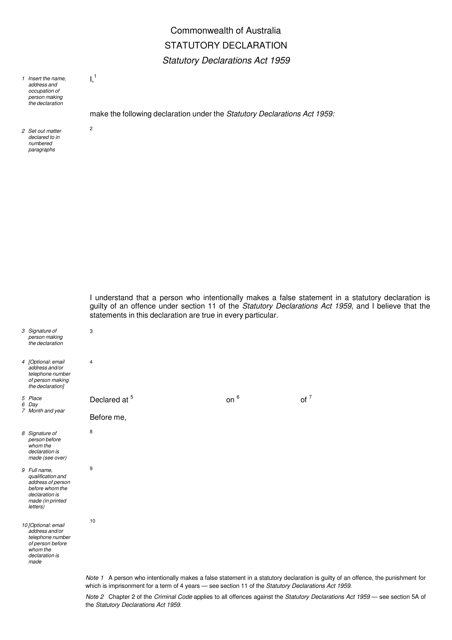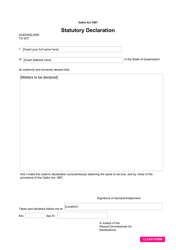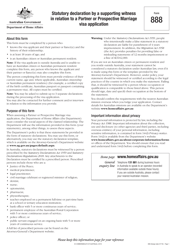Statutory Declaration - Australia
A Statutory Declaration in Australia is a written statement made voluntarily and signed in the presence of an authorized witness. It is used for various legal and administrative purposes, including affirming the truthfulness of a statement or declaration, confirming personal or financial details, verifying the accuracy of documents, and providing evidence in legal proceedings. Statutory Declarations are commonly used in situations such as immigration, visa applications, changing personal details on official documents, and submitting claims or applications to government departments.
In Australia, the statutory declaration can be filed by any individual who needs to make a formal statement or declaration under oath. This can include Australian citizens, residents, or even non-residents who have relevant information to provide or attest to. The purpose of a statutory declaration is to provide a written statement that is declared to be true and accurate, and it is commonly used for various legal, administrative, or official purposes.
FAQ
Q: What is a Statutory Declaration in Australia?
A: A Statutory Declaration in Australia is a legally binding document used to declare facts that are true and accurate to the best of a person's knowledge. It is often required in various legal or official situations where a written statement is needed, but no other form of evidence is available.
Q: When might I need to use a Statutory Declaration in Australia?
A: You may need to use a Statutory Declaration in Australia for a variety of reasons, including but not limited to: making statements about your identity, confirming your current address, declaring income or financial information, affirming the truthfulness of documents, or providing evidence for various legal or administrative purposes.
Q: How do I make a Statutory Declaration in Australia?
A: To make a Statutory Declaration in Australia, you need to follow these steps:
Q: Who can witness a Statutory Declaration in Australia?
A: In Australia, authorized witnesses who can sign and witness a Statutory Declaration include Justices of the Peace (JP), solicitors, barristers, police officers, Australian diplomatic officers, and authorized officers of government departments or agencies. The specific requirements for witnesses may vary based on your state or territory, so it's recommended to check the local regulations.
Q: Can I use a Statutory Declaration from another country in Australia?
A: Generally, a Statutory Declaration from another country is not valid or enforceable in Australia. If you need to make a declaration for Australian purposes, it is best to follow the process and use the official Statutory Declaration form provided within Australia.
Q: How long is a Statutory Declaration in Australia valid for?
A: In Australia, there is no specific expiration date for a Statutory Declaration. However, it is important to note that the information provided in the declaration should be accurate and up-to-date at the time of signing. If there are any changes to the facts or circumstances mentioned in the Statutory Declaration, it is recommended to make a new declaration reflecting the updated information.
Q: Are there any consequences for making a false Statutory Declaration in Australia?
A: Yes, making a false Statutory Declaration in Australia is a serious offense and can lead to legal consequences. If convicted, penalties can include fines, imprisonment, or both, depending on the nature and severity of the false declaration. It is crucial to provide truthful and accurate information when making a Statutory Declaration.








